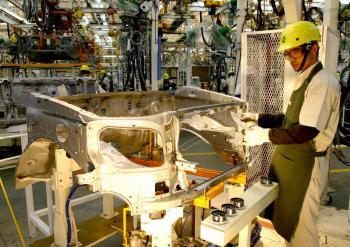[ Inflation in China Hits a 28-Month High - NTD ]
China’s National Bureau of Statistics (NBS) announced that the October Consumer Price Index (CPI) was 4.4 percent, the highest for the past 25 months. NBS announced on Nov. 19 a 30 percent increase in the prices of 80 percent of foods, while in early November the average wholesale price of 18 major vegetables in 36 cities was 3.9 yuan (US $ 0.6) per kg (2.2 pounds), up 11.3 percent from early 2010, and 62.4 percent more than during the same period in 2009.A survey conducted in late October by the financial website JRJ.com revealed that 85 percent of Internet users think “prices are escalating, but wages remain unchanged, and we cannot afford it!”
With prices for garlic, green beans, ginger, apple, sugar, edible oil, and cotton surging, Chinese people have turned to careful budgeting instead of mere complaints. They look everywhere for cheap goods—in supermarkets, grocery stores, and farmer’s markets. For many, a common topic of conversation is where to find the bargains.
Inflation has been a major social problem in China. According to NBS, the October 4.4 percent CPI rise is 22 percent higher than September. Food prices in October rose 10.1 percent over the year, compared to only 8 percent over the year in September.
To fight inflation, on Nov. 19 the Chinese regime introduced 16 measures to stabilize prices; they will also send groups of inspectors to supervise price stability. This is the latest action after the introduction of the “Four Measures” on Nov. 17, showing that the price surge is threatens both the poor and well-off.
According to Li Daokui from the Monetary Policy Committee of the People’s Bank of China, China’s largest concern at present is the fast price increase and adequate or excessive liquidity.
The decided on Nov. 16 to raise the financial institutions RMB deposit reserve ratio by 0.5 percent, only to announce on Nov. 29 another 0.5 percent increase. This is the fifth time this year the mainland central bank raised the deposit reserve ratio.
It is generally believed that the weak dollar, the slow economic recovery in Europe and America, and the appreciation of the RMB attracts hot money into China, adding to inflation woes. Although the People’s Bank has repeatedly raised its standard rate of deposit, the CPI is expected to be higher than 4.4 percent in November. The 0.2 percent housing price increase in November accelerated the pressure housing market bubbles. China’s bank interest rates will be further adjusted.
The rising food prices have also led to the popularity of a new phrase of greeting among mainlanders: “What’s cheap today?”
Read the original Chinese article.


